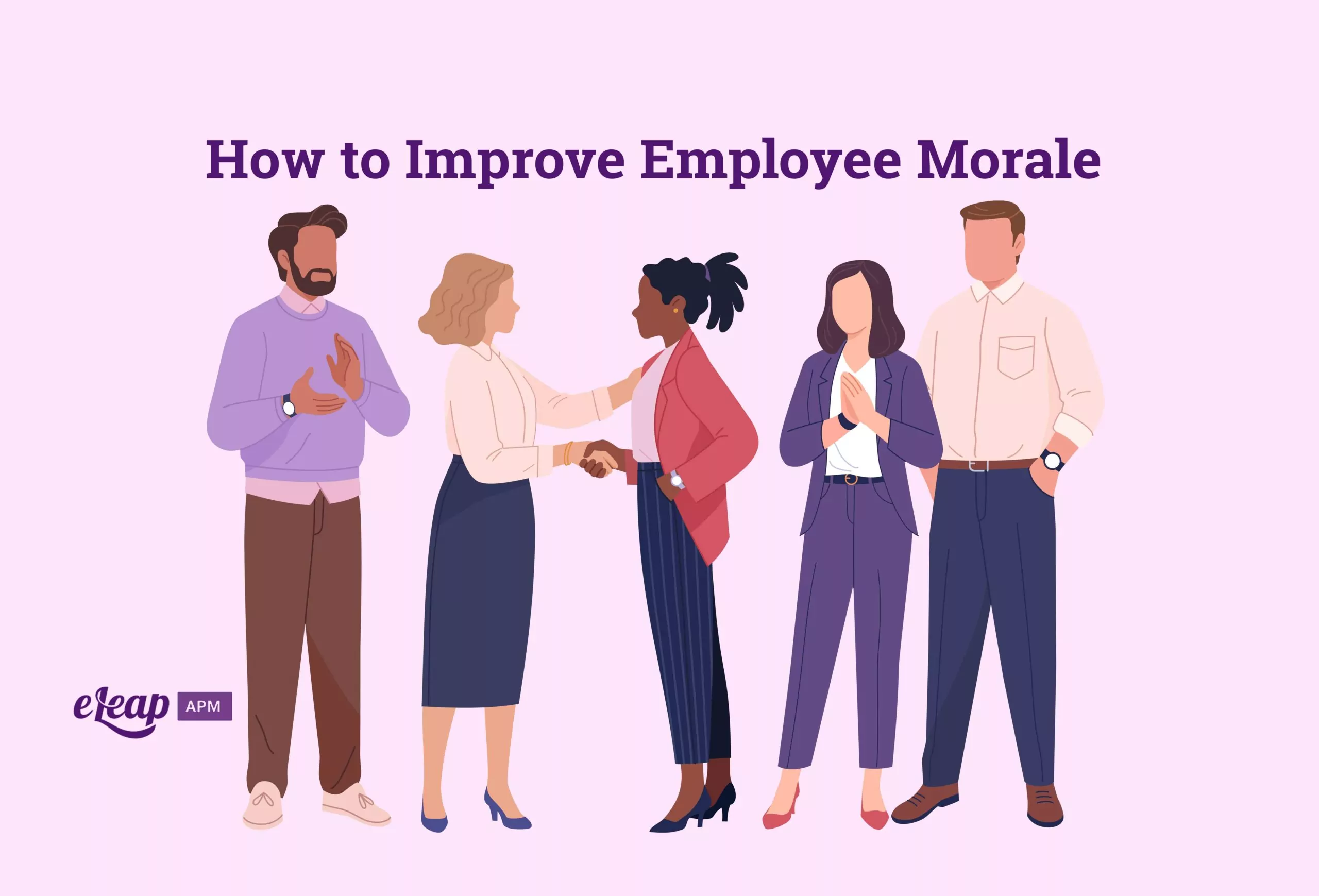How to Improve Employee Morale

Many think of employee happiness when they consider improve employee morale. However, employee morale encompasses more than happiness. When your employees have positive morale, it reflects the effectiveness of the leadership within your company. It also reflects the overall health of the company culture.
To accomplish high morale within the company, your employees need to feel that you take care of them. Giving them appropriate support allows them to be their best at work.
Boosting employee morale isn’t a one-time proposition. You should strive to help boost employee morale routinely. Follow these hints to contribute to the thriving culture of positive employee morale.
Boost Employee Morale with One-on-One Communication
Communication is key to creating and maintaining positive employee morale. Would you believe that 82% of employees who have weekly one-on-one communication feel they are getting needed support from leadership? Conversely, only 66% of those with less frequent one-on-one communication felt supported.
Communication is the easiest way to monitor progress. Regular communication can seem overly simple, but it’s essential for team engagement. Create a non-judgmental, safe space for employees to communicate with you and with each other.
Creating a structure for one-on-one communication allows management to make every meeting count. The system will enable them to get directly to the point of each conversation. Less rehashing of past events leads to greater trust between management and employees.
Fostering an atmosphere of improved regular communication increases employee engagement. An engaged employee is a more productive employee. Success in the workplace naturally boosts employee morale.
Work with your team to establish best practices for efficient communication. When the members of a team feel heard, they become more confident in their position. Confidence leads to engagement and productivity.

Allow Employees to Ask for Feedback
Feedback often seems negative. However, when done correctly, it can be a positive experience. In the traditional feedback model, managers approach employees and tell them something that needs improvement.
Today, employees appreciate the ability to request feedback. Managers who support an employee who asks for feedback gain the employee’s respect. Respect and trust go together.
Fostering an environment where employees feel safe to request feedback allows the employee to feel heard. It also allows them to take the initiative and improve their performance.
An employee who requests feedback is interested in self-improvement. They are typically self-aware and motivated to excel. Every employee can learn to solicit feedback within the right environment.
One way to foster an environment where employees request feedback is to incorporate it as a deliverable. When assigning projects, make asking a team member or manager for feedback the last step before completion. After a while, you won’t have to set it as a deliverable. It will be a natural step in the process.
Turn Your Managers into Coaches
A successful manager looks for an employee’s unique abilities. Finding each employee’s talents helps overall team performance. Create an environment that builds on the unique attributes of each individual.
Help your employees create a work atmosphere that connects their passions with the company’s mission statement. Incorporating their passions into their job description automatically boosts employee morale. Improved morale leads to improved productivity and engagement.
High performance is essential, but a manager that acts as a coach helps employees unlock their full potential. Following their passions is an intrinsic motivator for employees. An engaged, motivated employee uses their strengths to enhance the team’s capabilities.
An effective manager will recognize when employees aren’t reaching their full potential. This is when being attuned to natural talents is especially helpful. The manager can redistribute the workload so that the entire team works within their natural skill sets.
Assist with Personal and Professional Development
Professional development is a valuable tool for employee success. Give your employees the tools and resources they need to succeed. Create training programs that are detailed and thorough.
Set new hires up to succeed from the start. Remote employees need comprehensive training to keep them on target. Fostering a team environment for everyone will help boost employee morale across the entire team.
Work skills are important for the job, but work is only a portion of their lives. A holistic approach to employee development is crucial for their overall growth. Fulfillment comes when intangible skills are developed along with tangible ones.
Building training programs that include communication and empathy skills help employees grow professionally and personally. The bonus is that improving these soft skills helps prepare an employee for leadership in the future. As they grow, employees will see more fulfillment in their lives in general.
Share Your Appreciation
Recognizing your team’s contributions in the workplace boosts employee morale significantly. One aspect of a high-performing team is its supportive nature. A team that feels appreciated is an engaged, creative, and productive team.
Appreciation is a contagious thing. Showing appreciation for your team gives an almost instantaneous morale boost. Regularly recognizing employee accomplishments leads to less tension in the workplace.
When you show your team appreciation, they feel valued. A valued employee is a productive employee. An effective employee adds value. Do you see the cycle?
You can show appreciation in numerous ways. It can be as simple as a comment on a job well done. You can send an email or thank you note for someone’s role on a specific project.
An excellent way to boost employee morale is to acknowledge the entire team for a job well done. Learn everyone’s coffee order and spring for coffee and doughnuts for the whole team. Reward extra effort with a half-day off with pay for everyone.
Use your imagination. As an effective leader, you can find your own ways to express appreciation to the team for successful project completion.
Remember, employees want to feel appreciated even when they haven’t just completed a huge money-making project. For example, your chronically late employee has successfully been on time for a month. Let them know you noticed.
Someone who was a wallflower now takes the initiative to start meetings. Acknowledge the effort. One of the team brews coffee in the breakroom every morning without being asked. Thank them.
Small gestures on your part will significantly boost employee morale. When your team feels appreciated, they will be more productive.
Connect Through Fun
Many people approach the responsibility of management with extreme seriousness. The extreme seriousness creates a divide between you and your team. Sometimes, employees need to see you let your hair down.
Of course, you need to be serious at times, but at other times, you can relax and enjoy time with your team. Find ways to incorporate personal connection into the workday. Allow your employees to see your authentic self.
Employees see you as approachable when you allow yourself to relax and show your humanity. As your team begins to relate to you, they see you as part of the team. They also realize that you view them as people rather than just employees.
Bringing some appropriate lightheartedness into the workplace is a great employee morale booster. You can be an effective leader while still facilitating a more relaxed atmosphere. When employees see you are more comfortable, they will relax more, too.
A cohesive team has a personal connection. Find ways to get to know your team on a personal level as well as a professional one.
You might consider building fun team-building activities into your routine. For example, you could organize a softball game between your department and another department one afternoon after work. Show a movie in the conference room and provide snacks.
Scavenger hunts and team trivia challenges are other great team-building activities. Options are limitless for adding fun to your work environment.
Encourage Appropriate Breaks
Did you know that many people don’t actually take a lunch break? Statistics show that only 1 in 5 people take a break for lunch. White-collar workers have the highest percentages of people who don’t take breaks.
A change of scenery boosts creativity. Innovative ideas occur when people allow themselves time in a more natural environment.
Employees need regular breaks. Encourage them to leave their desks at least once every hour. You also set an example by leaving your desk for at least five minutes every hour.
What can you do in five minutes? Grab a cup of coffee. Walk into the hallway or outside and stretch. Have a conversation with the receptionist about her son’s baseball game.
Making these short breaks a habit can increase productivity. Encouraging your employees to take a break is a morale booster.
Regular breaks and lunches are essential tools for every employee. If you work particularly long days, frequent breaks are even more important. Sitting in the same location hour after hour contributes to brain fog and reduced productivity.
Focus on Health
When an employee is stressed, their accuracy and productivity decline. Excess stress can lead to illness and dissatisfaction with the job. However, working to help employees reduce their stress levels can have the opposite effect.
If stress is a significant factor in your industry, you might consider implementing an Employee Assistance Program. These programs help employees work through issues, whether work-related or not. Working through the issues helps your employees stay healthy and productive.
Other ideas for promoting employee wellness include creating a meditation or workout space within your office. Perhaps you have an unused conference room that would be perfect for converting to an employee space. Supplying areas like this reinforces that you value your employees as people, not just workers.
The Takeaway
Employee morale directly affects productivity. When you show your employees that you value them, it allows them to feel supported and heard. Taking these simple actions can elevate employee morale and help your employees confidently perform at their best.